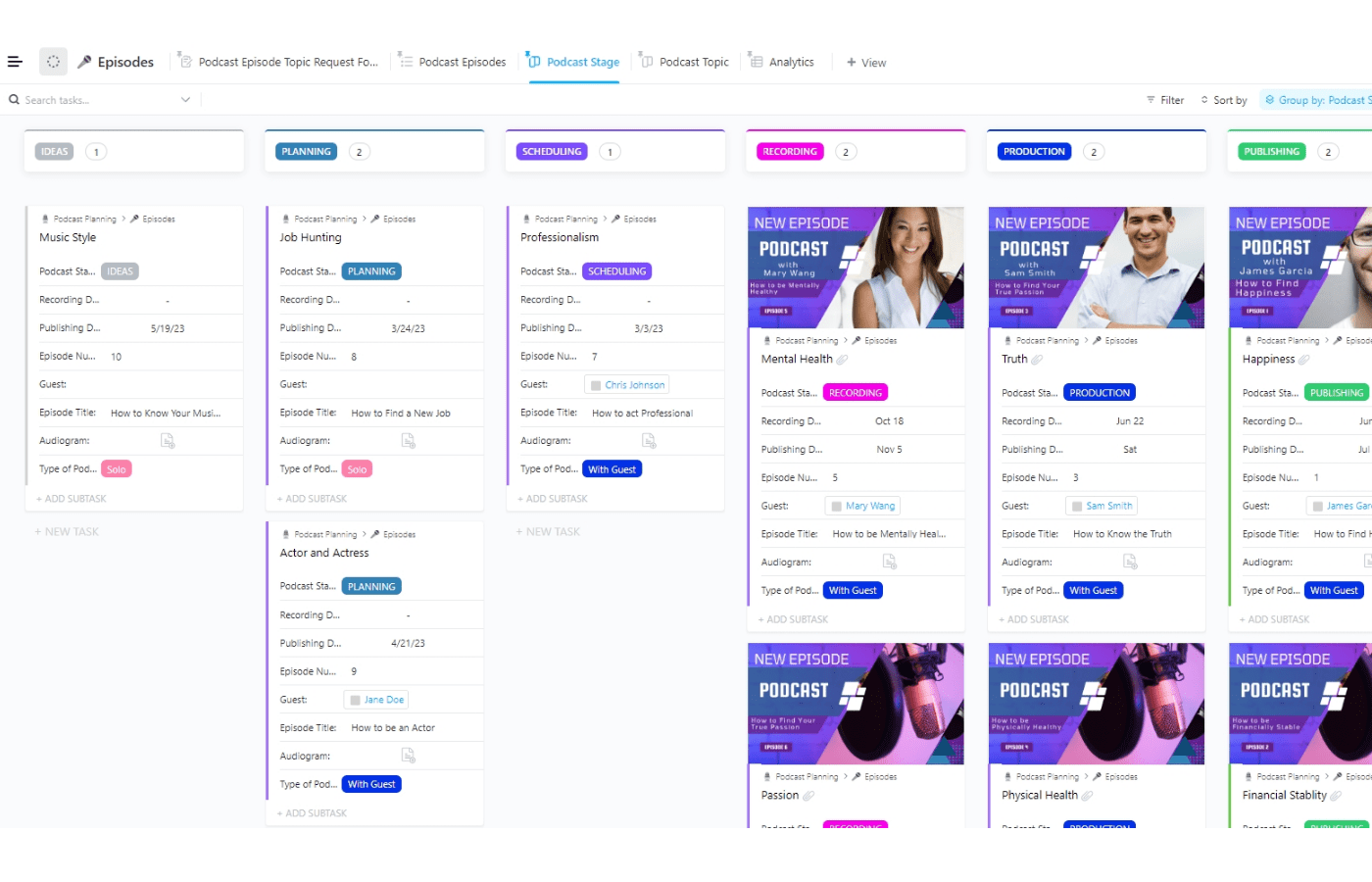Key takeaways
Successful project management depends on a team-wide understanding of roles and responsibilities. Using a RACI matrix to assign and define each role is a great way to keep a project on track and positioned for success, especially when used in conjunction with other documents like the requirement traceability matrix.
In a hurry?
Download Smartsheet’s free RACI matrix template, which delivers all the information the team needs in a single, easy-to-read screen.
What is a RACI Matrix?
A RACI matrix is a tool in project management designed to clarify team roles and responsibilities across tasks.
Each role is categorized as Responsible, Accountable, Consulted, or Informed, ensuring that everyone understands their role in a project’s success. By assigning these roles, project managers prevent confusion and overlapping duties while increasing accountability.
The RACI framework is especially beneficial for complex projects where clear role distribution is essential for smooth workflows and improved communication.
How Does a RACI Chart Help Project Managers?
Project managers use RACI charts to keep track of team roles and relay those responsibilities to the larger team.
The matrix defines clear roles and responsibilities for individual team members across the various phases of the project, breaking the roles down into four types. Each letter of the project management acronym stands for a designation: those who are responsible and accountable for project deliverables, those who should be consulted as work begins, and stakeholders who need to be informed of ongoing progress, roadblocks, and updates.
4 Core Roles of RACI Defined
Responsible
The individual(s) with responsibility for the task or deliverable is responsible for developing and completing the project deliverables themselves. The responsible parties are typically hands-on team members who make direct contributions toward the completion of the project. The responsible team is composed of the project’s doers, who work hands-on to ensure that each deliverable is completed.
Some examples of responsible parties are:
- Project managers
- Business analysts
- Developers
- Graphic designers
- Copywriters
One risk when using a RACI matrix is unintentionally overloading a single team member with too many responsibilities. If one person is designated as Responsible for too many tasks, they may struggle to manage their workload, leading to delays or burnout. To avoid this, project managers should carefully distribute responsibilities across the team and ensure that no individual is overwhelmed. Regularly reviewing the matrix throughout the project helps identify and address any imbalances before they become critical.
Accountable
Accountable parties ensure accountability to project deadlines, and ultimately, accountability to project completion. This group frequently also falls under the informed category.
Some examples of accountable parties are:
- Product owners
- Signature authorities
- Business owners
- Sponsors
- Key stakeholders
By clearly defining roles, a RACI matrix prevents decision-making bottlenecks and confusion in the approval process. When roles are ambiguous, critical decisions can get delayed, as team members might not know who holds final accountability. The RACI model eliminates this issue by ensuring that the individual responsible for approvals is clearly designated as Accountable. Additionally, identifying who needs to be consulted or informed reduces unnecessary back-and-forth, allowing decisions to be made quickly and efficiently without roadblocks. This clear communication flow optimizes project progression and prevents delays.
Consulted
Consulted individuals’ opinions are crucial, and their feedback needs to be considered at every step of the game. These individuals provide guidance that is often a prerequisite to other project tasks, for example, providing legal guidance on a project throughout the process. If you are working on new product development or expansion, this could essentially be the entire organization.
Some examples of consulted parties are:
- Legal experts
- Information security and cybersecurity experts
- Compliance consultants
Informed
Informed persons are those that need to stay in the loop of communication throughout the project. These individuals do not have to be consulted or be a part of the decision-making, but they should be made aware of all project updates. Typically, this party consists of business owners or stakeholders that are more interested in viewing the project at a 30,000-foot view. Keep this group on your CC list for awareness of topics, decisions, and progress — that includes making them part of the initial project kickoff and project demos as optional attendees. This group often also falls under the accountable group.
Some examples of informed parties are:
- Project committee members
- External stakeholders
- Business owners
Why Are RACI Roles Important?
The same way a requirements traceability matrix provides accountability to project requirements by mapping out the relationship between these requirements and the project work, RACI roles provide a sense of organization and clarity for teams that are looking to divide roles and keep team members accountable for their contributions. Considering that 27 percent of projects go over budget, for reasons like scope creep and lack of defined roles, RACI roles help position a project for success and avoid common pitfalls.
RACI roles help ensure that communication between all roles is ongoing. When you consider that nearly half of all project spending is at risk of being wasted due to a lack of effective team-based communication, it becomes all that more important to prioritize.
How RACI helps with communication
The RACI matrix significantly enhances communication by clearly defining who needs to be involved at each stage of a project. By outlining who is Responsible, Accountable, Consulted, and Informed, it ensures that the right stakeholders are engaged at the right times.
This structured approach reduces miscommunication, which is one of the most common causes of project failure, as team members know exactly who to reach out to for input or updates. Keeping stakeholders informed also improves transparency, preventing misunderstandings and ensuring everyone is aligned with project goals and timelines.
How to Create a RACI Matrix
If you’re looking to implement a RACI matrix as part of your team’s project planning process, take these steps to create a RACI matrix.
- Plan ahead before taking action. Ensure that you have a thorough understanding of the project and its demands before outlining any further steps by communicating with key stakeholders and decision-makers.
- Define the scope of the project. List down all key activities and deliverables from the director of program management or other leadership.
- Determine who the involved parties are. Know who is needed to be a part of the project or initiative.
- Outline each project role. Determine the project roles and responsible job titles and persons for each activity and deliverable.
- Gather as a group. Hold review sessions with key members of the team for alignment, and if you haven’t already, host a kickoff meeting with the entirety of the team and key stakeholders to unveil the matrix, address questions, and more.
If the project has already started, it’s not too late to implement a RACI matrix. Just follow the following steps:
- Outline the story. Using research from multiple sources, do a, b, c, and d.
- Utilize steps 2 and 3 (as shown above). Ensure the right groups are assigned and engaged.
- Hold a review session. Ensure that the team acknowledges and discusses the plan and the roles assigned.
If you need more information on how to create a RACI matrix, there are several RACI training courses and other resources you can use to get started.
RACI Matrix Examples
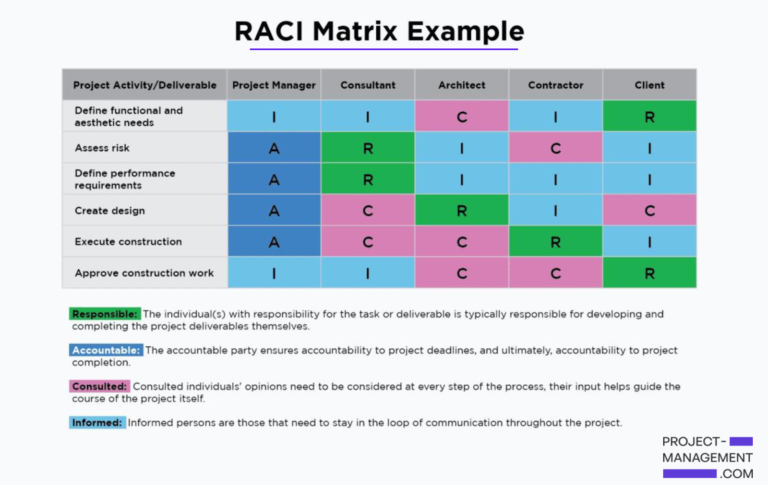
A RACI matrix helps break down what roles individuals will play as work is carried out and to what extent they will be involved in the project overall. The horizontal axis represents each person on the project team and the vertical axis represents each task.
Each square of the matrix represents an individual, a task, and that individual’s role within the project, either responsible, accountable, consulted, or informed.
In this situation, for example, the project manager is accountable for assessing risk, defining performance requirements, creating designs, executing construction, and approving construction work. However, they are only informed about approving construction work and defining functional and aesthetic needs.
Who Creates the RACI Matrix?
The RACI matrix — sometimes called RACI model, RACI diagram, or simply just RAC — is created by the project manager at the start of the project as a key part of establishing the initial human resources planning for the project.
Because miscommunication is a common threat to any project, RACI charts are a great asset to teams dealing with any type of work, from very simple projects to extremely complex ones.
Software Integration with Common PM Tools
Integrating the RACI Matrix into project management software makes it easier to assign roles and responsibilities. Here’s how the RACI Matrix works with popular tools:

Asana
Asana allows you to assign tasks and label roles like Responsible or Accountable directly in its project boards. By integrating RACI, project managers can easily track who is accountable for each phase, preventing miscommunication and task overlap. This tool also supports team collaboration by keeping all RACI role assignments visible in one place.

Jira
In Jira, RACI roles can be linked directly to project tickets. This integration helps project managers oversee who is accountable for each task while tracking the project’s progress through detailed reporting. Jira’s focus on issue tracking aligns perfectly with the RACI framework, ensuring that each decision and approval process is well-defined.

Trello
Trello utilizes labels and categories to represent RACI roles. With its simple, card-based format, project managers can visually assign and manage tasks, ensuring clarity on who is responsible or consulted at each stage. This tool is especially effective for smaller teams needing a clear overview of task assignments.
Integrating the RACI matrix into these tools enhances accountability and clarity, making it easier for teams to stay aligned on task responsibilities and avoid delays.
RACI and Stakeholder Analysis
Stakeholder analysis is a crucial step that directly connects to the RACI matrix. By identifying all relevant stakeholders, project managers can effectively assign roles within the matrix.
This process helps clarify who has a vested interest in the project and ensures their roles are properly reflected in the matrix.
To run a stakeholder analysis:
- Identify key stakeholders: Determine who has a vested interest in the project’s success (e.g., clients, executives, team members).
- Define stakeholder influence: Assess how much influence each stakeholder has over project decisions.
- Align stakeholder roles with RACI: Assign stakeholders as Responsible, Accountable, Consulted, or Informed based on their role in the project.
- Maintain communication channels: Ensure stakeholders are appropriately informed of project progress, updates, and changes.
- Review regularly: Reassess stakeholder involvement as project phases evolve.
Aligning stakeholder involvement with RACI creates a roadmap for communication and decision-making that keeps everyone engaged and informed throughout the project life cycle.
Common Mistakes When Creating a RACI Matrix
- Failure to plan ahead: A RACI matrix should not be the first step in your project planning. Before preparing the matrix, ensure you have a fully assembled project team and a clear understanding of your project scope and key tasks. Without a basic structure in place, the matrix can become chaotic and difficult to manage. Starting with a rough project plan helps ensure that the RACI matrix aligns with your overall goals.
- Working with too large a team: The larger the team, the more complex the RACI matrix can become, leading to confusion rather than clarity. A matrix with too many roles or stakeholders can make responsibilities difficult to track and dilute accountability. For larger teams, consider breaking the project into smaller, manageable components, or you can use alternative frameworks. Between the DACI vs RACI model, DACI may be better at accommodating scale.
- Not communicating with the project team: A RACI matrix is meant to formalize responsibilities, not introduce them for the first time. Ensure that all team members are briefed on their roles and the project’s objectives before creating the matrix. Holding a kickoff meeting where tasks and responsibilities are discussed ensures everyone is aligned and prepared, preventing misunderstandings or confusion about their roles in the execution of the project.
- Overburdening team members: Assigning too many roles to a single person can lead to burnout and inefficiencies. If one team member is designated as both Responsible and Accountable for multiple tasks, they may become overwhelmed and unable to perform effectively. Regularly review the RACI matrix to ensure workload distribution is balanced and that no individual is shouldering too much responsibility.
- Hitting decision-making roadblocks: Without a clear assignment of who is Accountable for decision-making, tasks can get delayed as teams wait for approvals. This bottleneck can slow progress and create frustration. By explicitly identifying who has the authority to make final decisions, you ensure a smoother workflow and prevent key tasks from stalling due to indecision or unclear lines of accountability.
RACI Matrix Pros & Cons
RACI Alternatives
While the RACI matrix is a widely used tool, several alternatives may be more suitable depending on your project’s needs:
- RASCI: Adds a Support role to the traditional RACI structure, providing extra assistance where necessary.
- DACI: The DACI framework focuses on decision-making by identifying clear Decision Makers and those accountable for final outcomes.
- RAPID: A decision-making framework that defines who Recommends, Agrees, Performs, Inputs, and Decides on critical decisions.
- Gantt chart: Provides a comprehensive view of who does what and when, combining responsibilities with timelines in a visual format.
- Work breakdown structure: Breaks down the entire scope of work in a project, offering a detailed view of all tasks in a hierarchical structure.
- Project dashboard: Offers dynamic, real-time oversight, keeping teams informed with up-to-date information on project progress, roles, and responsibilities.
Each RACI alternative differs on task ownership and project management. The best project managers choose the right approach based on their project’s needs.
Free RACI Matrix Templates
A number of project management software solutions include a native RACI matrix template. Here are just a few we found.
Our pick: most useful free RACI matrix template
We love this template from Smartsheet because it’s colorful, thorough, and includes room for every party involved in the project. Additionally, we appreciate the extra work SmartSheet put into these key areas:
- Project phases make the matrix more immediately understandable for stakeholders of all kinds.
- Simple status column gives the reader a bird’s-eye view of the project’s progress.
- Roles by deliverable clarify for any given team member whether they’re an R, A, C, or I which is important; very few people end up having the same level of responsibility from a project’s beginning to its end.
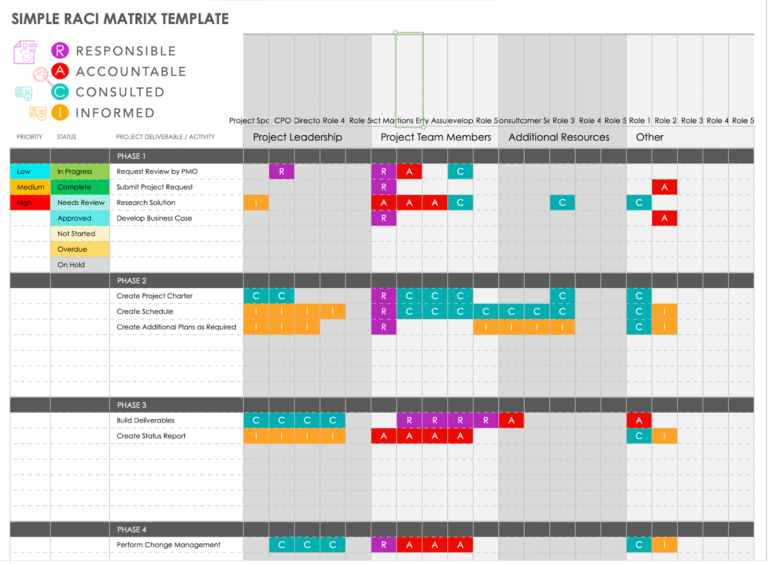
Robust RACI template for clarifying roles and responsibilities
Wrike’s RACI template is efficient for identifying and clarifying roles and responsibilities of members within a project team.
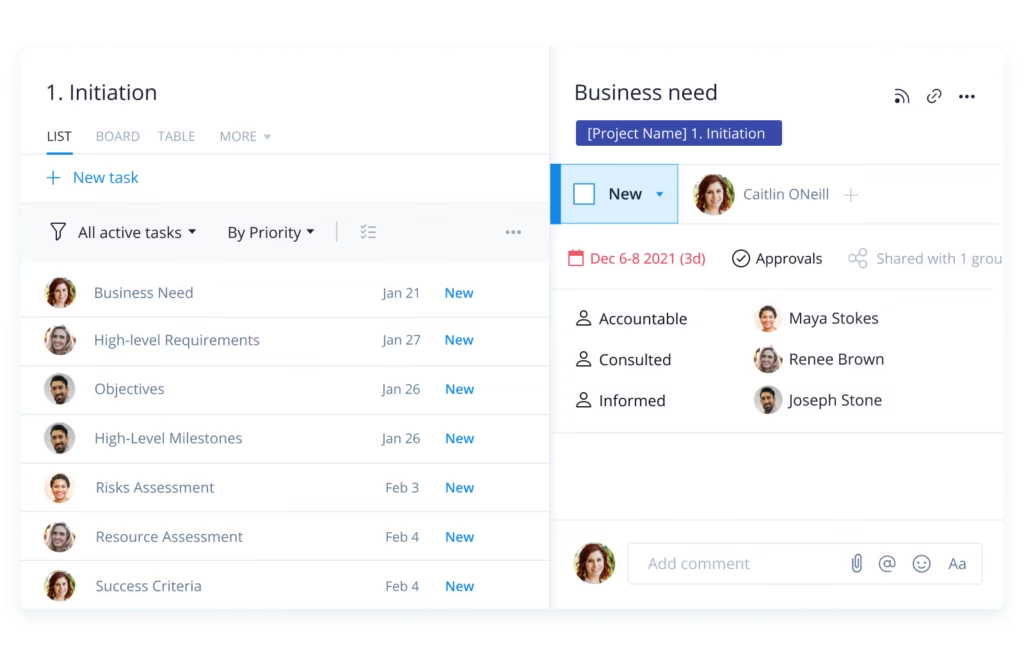
RACI matrix template ordered by task and stakeholder
This template from the Academy to Innovate HR is a great choice for project managers who want to organize their team roles with an easy-on-the-eyes chart that evolves beyond the simple spreadsheet.
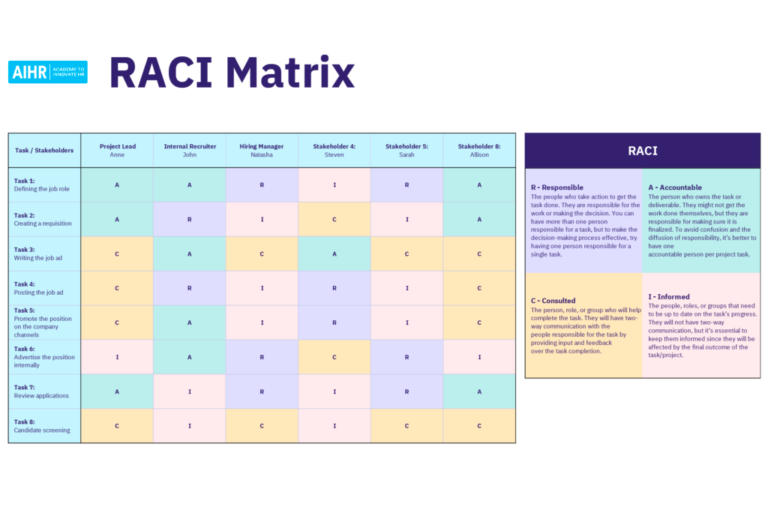
Simple RACI chart
These RACI templates from ClickUp have enough variety to fit any of your project needs, but are simple enough for even beginner PMs to use.
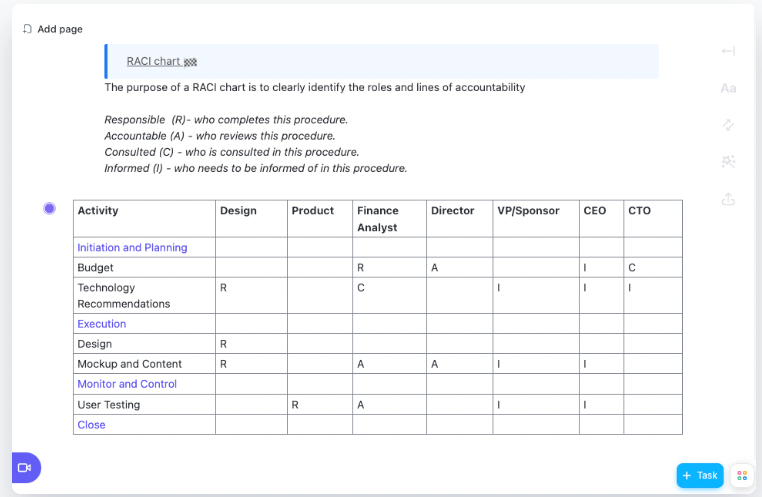
Detailed RACI matrix template
This template is a great starter template for anyone looking to explore RACI charts in their project management strategy. As an added bonus, it comes with the RACI definitions already built in!
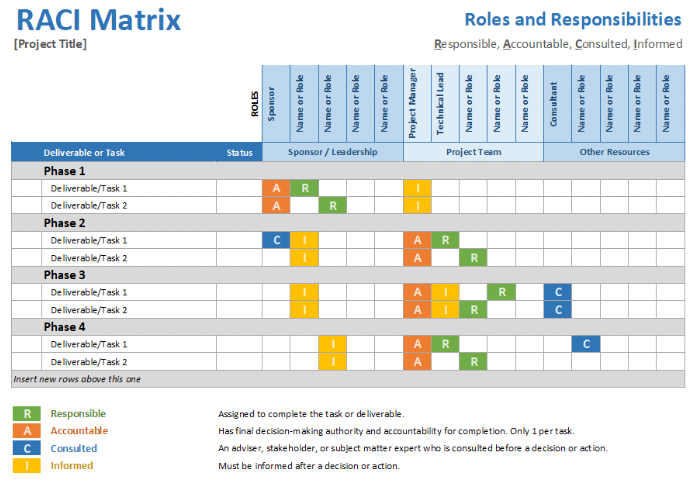
Excel-based RACI chart template
Are you an Excel or Google Sheets user looking to take advantage of the RACI matrix? An Excel-formatted template from Project Management Docs might just be the solution for you. This template is a great template for users who want a chart that comes in a preformatted structure.
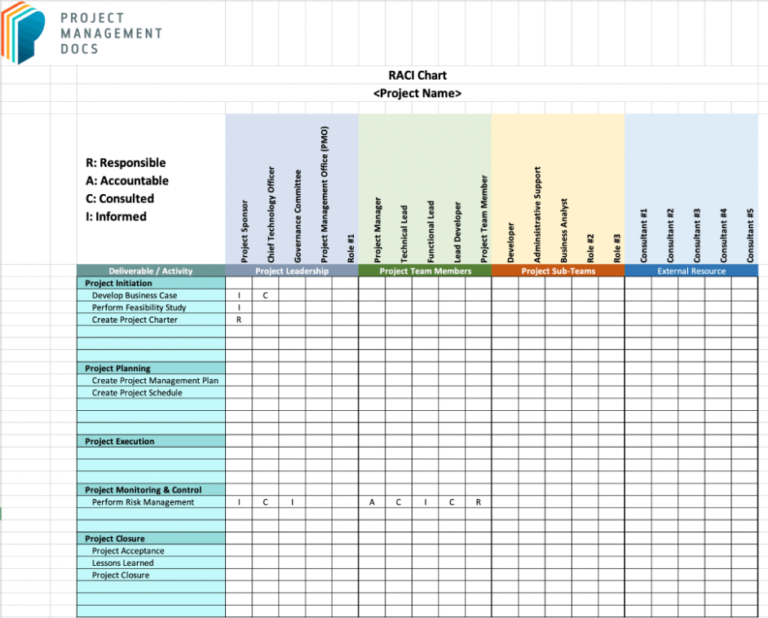
FAQs
Bottom Line: Why RACI Matrix Is a Valuable Project Management Tool
The RACI matrix remains a powerful tool for defining roles and responsibilities in project management, helping teams avoid confusion and delays. By clearly assigning who is Responsible, Accountable, Consulted, and Informed, project managers can streamline communication, prevent decision-making bottlenecks, and ensure accountability.
While alternatives like RASCI or DACI exist, RACI is especially useful for smaller teams and simpler projects. When used correctly, it significantly enhances project clarity and efficiency, leading to smoother execution and more successful outcomes.


